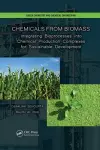
Chemicals from Biomass
2 authors - Paperback
£81.99
Debalina Sengupta received her bachelor of engineering degree in chemical engineering from Jadavpur University, Calcutta, India, in 2003. She worked as a software engineer in Patni Computer Systems from 2003 to 2004. In 2005, she joined the Department of Chemical Engineering at Louisiana State University, Baton Rouge, Louisiana. She received her doctor of philosophy degree in chemical engineering under the guidance of Professor Ralph W. Pike for her research titled "Integrating bioprocesses into industrial complexes for sustainable development" in 2010. Her expertise is in optimization of industrial complexes and sustainability analysis using total cost assessment methodology. She is now working as an ORISE postdoctoral fellow at the United States Environmental Protection Agency. Her current research is focused on sustainable supply chain design of biofuels and includes life cycle assessment (LCA) for ethanol as biofuel. Her research interests include chemicals from biomass, modeling, simulation, and optimization, as well as life cycle assessment and sustainability analysis.
Ralph W. Pike is the director of the Minerals Processing Research Division and is the Paul M. Horton Professor of Chemical Engineering at Louisiana State University. He received his doctorate and bachelor’s degrees in chemical engineering from Georgia Institute of Technology. He is the author of a textbook entitled Optimization for Engineering Systems and coauthor of four other books on design and modeling of chemical processes. Pike has directed 15 doctoral dissertations and 16 master’s theses in chemical engineering. He is a registered professional engineer in Louisiana and Texas. His research has been sponsored by federal and state agencies and private organizations, with 107 awards totaling $5.6 million, and has resulted in over 200 publications and presentations. His research specialties are optimization theory and applications for the optimal design of engineering systems, online optimization of continuous processes, optimization of chemical production complexes, and related areas of resources management, sustainable development, continuous processes for carbon nanotubes, and chemicals from biomass.